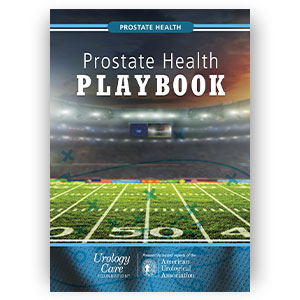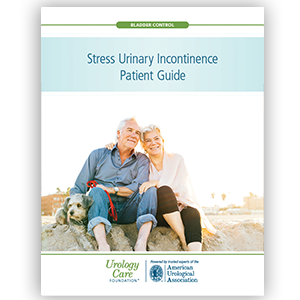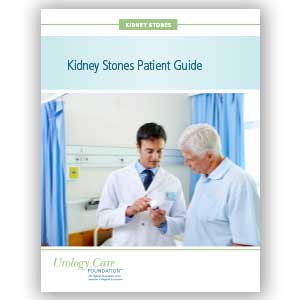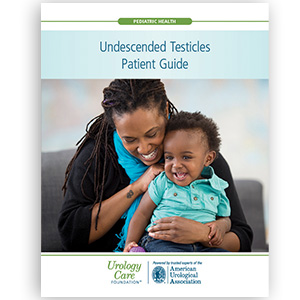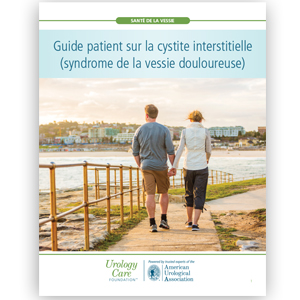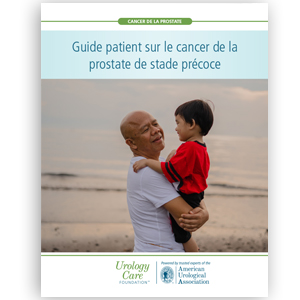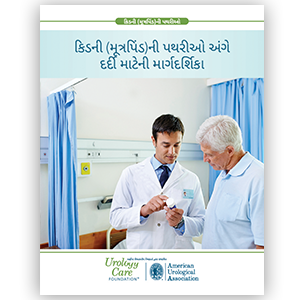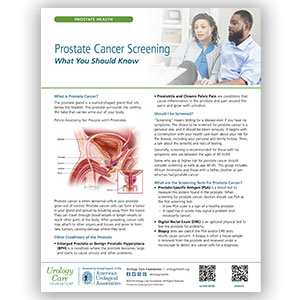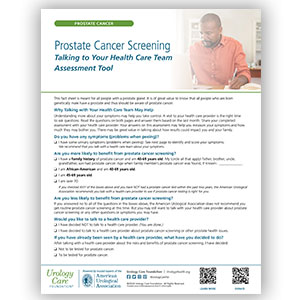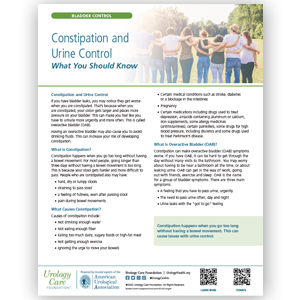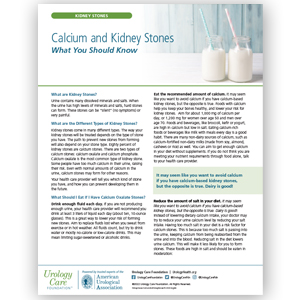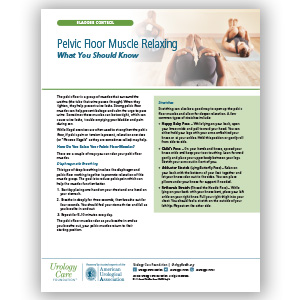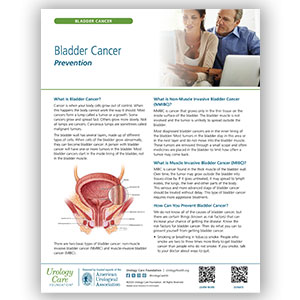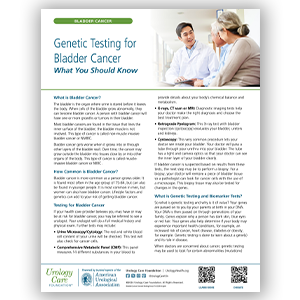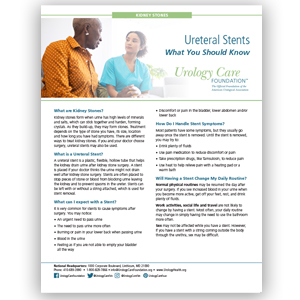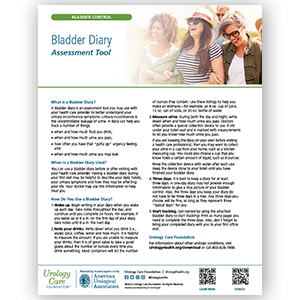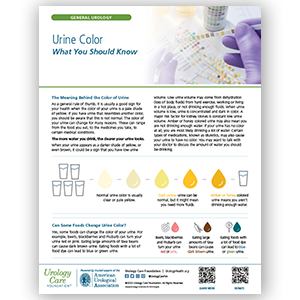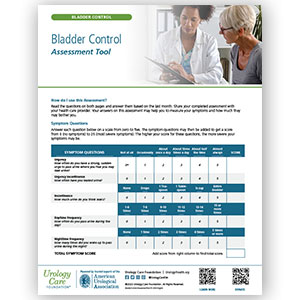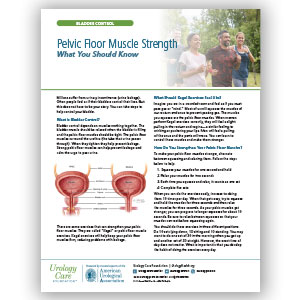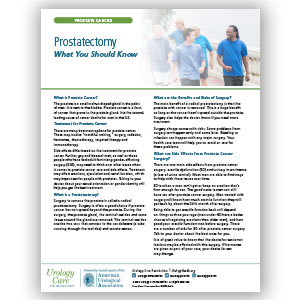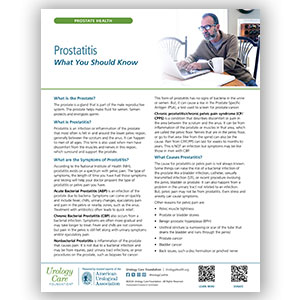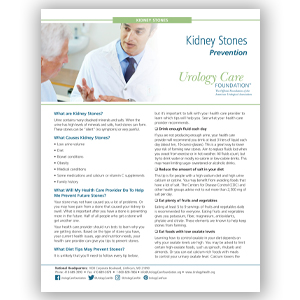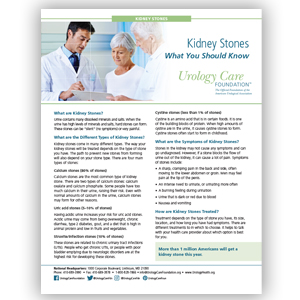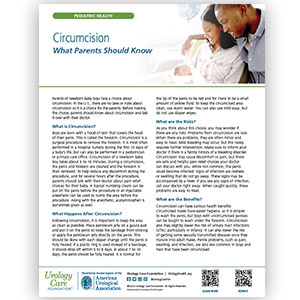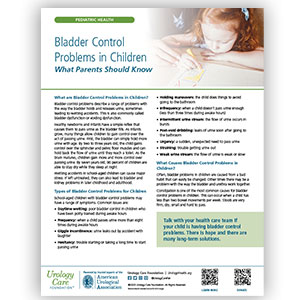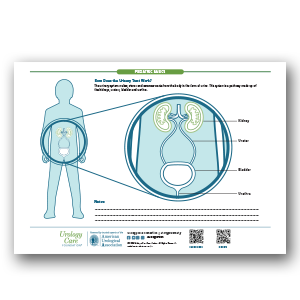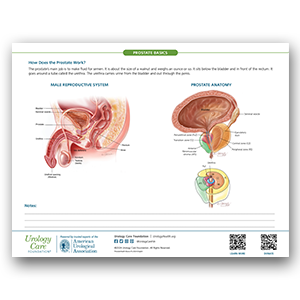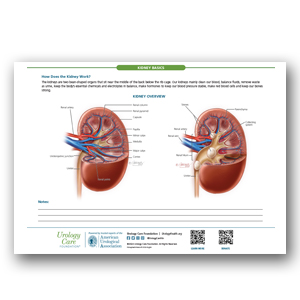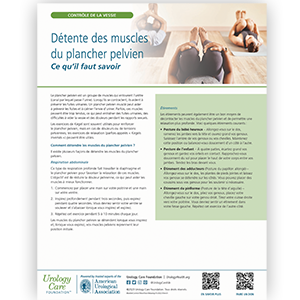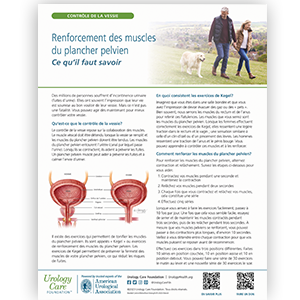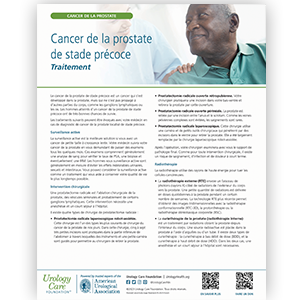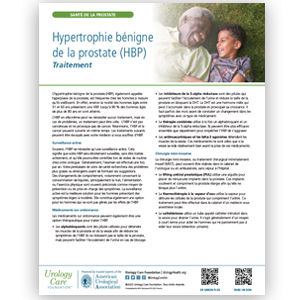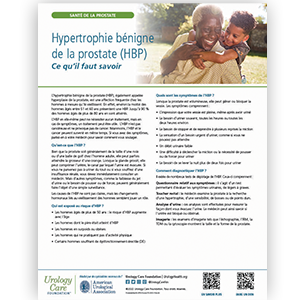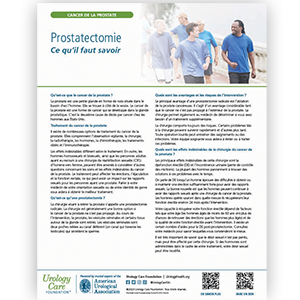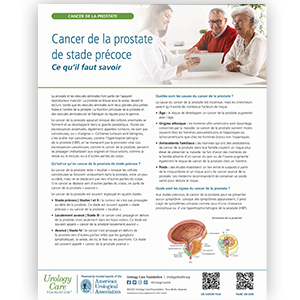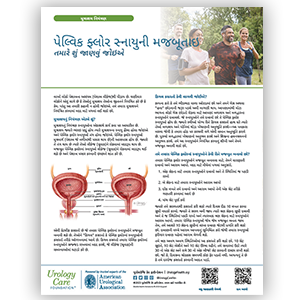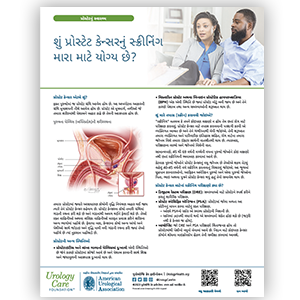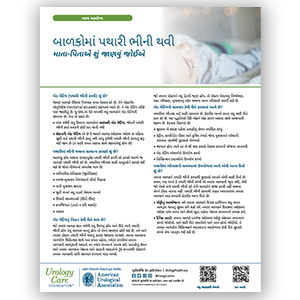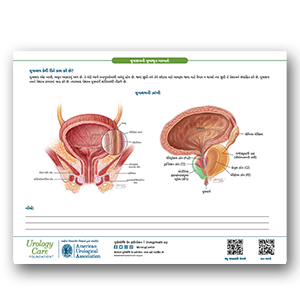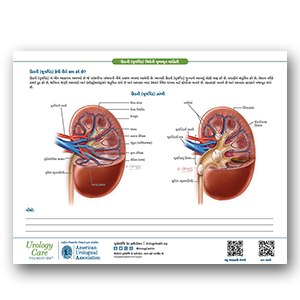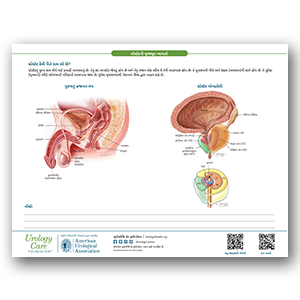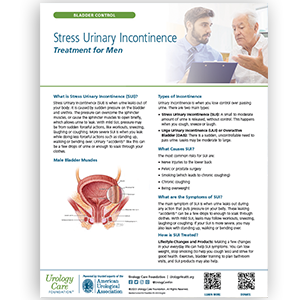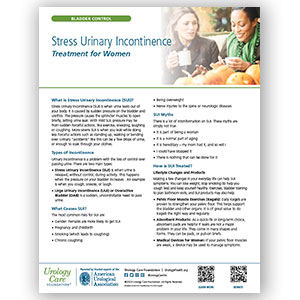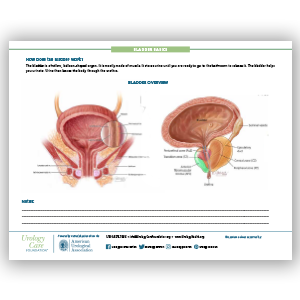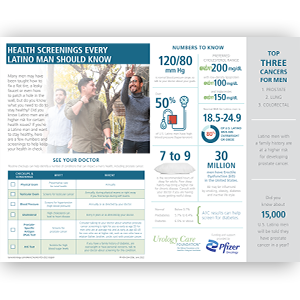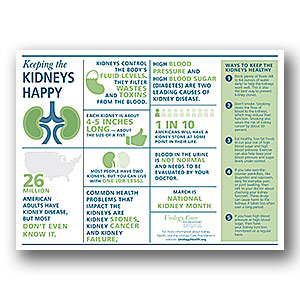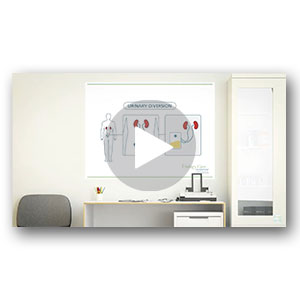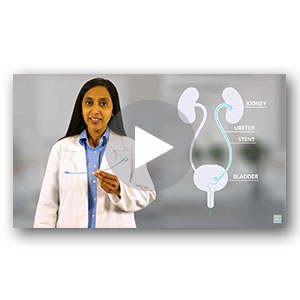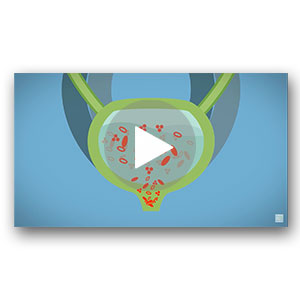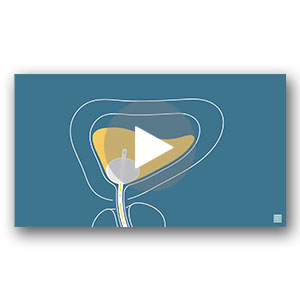Prostate Health Playbook
Order this football-themed prostate health resource covering prostatitis, BPH, incontinence as well as information on prostate cancer to include screening and treatment options.… more
Bladder Cancer Patient Guide
Guide with information about how to diagnose, treat and manage bladder cancer, including a patient perspective.… more
Living Healthy Cookbook with Information about Urologic Cancers
Part of managing cancer includes a healthy diet and lifestyle. This educational cookbook has recipes from celebrity chefs and is designed to help those affected by urologic cancers.… more
Living Healthy Cookbook with Information about Urologic Cancers
Part of managing cancer includes a healthy diet and lifestyle. This educational cookbook has recipes from celebrity chefs and is designed to help those affected by urologic cancers.… more
Living Healthy: Fight Kidney Stones with Food Cookbook
An educational recipe book designed to help prevent kidney stones with nutrition and diet.… more
Stress Urinary Incontinence (SUI)
Download this patient resource on Stress Urinary Incontinence (SUI).… more
Prostate Health Playbook
Download this football-themed prostate health resource covering prostatitis, BPH, incontinence as well as information on prostate cancer to include screening and treatment options.… more
Guide patient sur la cystite interstitielle (syndrome de la vessie douloureuse)
La cystite interstitielle (CI), ou syndrome de la vessie douloureuse (SVD), est un problème de douleur vésicale chronique. Cela peut évoquer une infection de la vessie ou infection urinaire, mais ce n’en est pas une. Il s’agit d’une sensation d’inconfort et de pression dans la région de la vessie qui dure six semaines ou plus, sans infection ni autre cause évidente. (Patient Guide to Interstitial Cystitis (Painful Bladder Syndrome))… more
Guide patient sur le cancer de la prostate de stade précoce
Le cancer de la prostate est la deuxième cause de décès par cancer chez les hommes aux États-Unis. La plupart des hommes ayant un diagnostic précoce peuvent vivre longtemps. Choisir son traitement peut être difficile. Informez-vous et posez des questions afin de faire le choix qui vous conviendra le mieux. (Early-stage Prostate Cancer Patient Guide)… more
આજે અતિસક્રિય મૂત્રાશય વિશે વાત કરવા નો સમય છે
યુનાઇટેડસ્્ટટેટ્્સમાં લાખોલોકોમૂત્રાશયની સમસ્્યયાઓનોસમૂહએવા અતિસક્રિય મૂત્રાશય (OAB) સાથે સંઘર્્ષકરી રહ્યાછે. OABમાં તમારુુંમૂત્રાશય ખરેખર ભરાયેલું ન હોય ત્્યયારે પણતમારા મૂત્રાશયને પેશાબ કરવાની તીવ્ર ઇચ્્છછાથાય છે. કેટલીકવાર એવું બને છે કે તમારુુંમૂત્રાશય અતિશય સંવેદનશીલબની જાય છે અને કેટલીકવાર એવું પણબને છે કે તમે તેને પરવાનગી ન આપોતોપણતે પેશાબ કરવાની છૂટઆપી દે છે. (Overactive Bladder Patient Guide)… more
મૂત્રાશયના કૅન્્સરનાં દર્ દી માટેની માર્્ગદર્્શ શિકા
મૂત્રાશયનું કૅન્્સર ઘણીવાર મૂત્રાશયનાઅસ્્તરમાં શરૂ થાય છે.મોટાભાગનાકૅન્્સરની જેમ, મૂત્રાશયનાકૅન્્સરનું વહેલું નિદાન કરાવવાથી તમને વધુ સારવારનાવિકલ્્પપોઅને સારાપરિણામો મળી શકે છે. (Bladder Cancer Patient Guide)… more
પ્રોસ્્ટટૅટ કૅન્્સરનો પ્્રાાંરભિક તબક્કો દર્ દી માટ ેની માર્્ગદર્્શશિકા
પ્રોસ્્ટટૅટકૅન્્સર U.S.માંપુરૂષોમાટે કૅન્્સરથી થતામૃત્્યયુનુંબીજું અગ્રણી કારણગણાય છે, મોટાભાગનાપુરૂષોજેઓને વહેલી ખબર પડે છે તેઓ લાંબુ જીવન જીવી શકે છે. (Early-stage Prostate Cancer Patient Guide)… more
કિડની (મૂત્રપિંડ)ની પથરીઓ અંગે દર્ દી માટેની માર્ ્ગદર્્શશિક ા
કિડની (મૂત્રપિંડ)ની પથરીઓનો રોગ એ મૂત્ર પ્રણાલીની સૌથી સામાન્્યસમસ્્યયાઓમાંની એકછે.U.S.માં પથરીઓ ધરાવતા લોકોની સંખ્્યયાવધી રહી છે. (Kidney Stones Patient Guide)… more
મૂત્રપિંડ કૅન્્સરનાં દર્ દીઓ માટેની માર્્ગદર્્શશિકા
તમારા ડૉકટરે હમણાં જતમને સમાચાર આપ્્યયાાંછે કે તમારા મૂત્રપિંડમાં વૃદ્ધિ થઈ છે.તે શું છે અને એનો તમારા માટે શું અર્્થથાય છે? આપણાં મૂત્રપિંડનું મુખ્્યકાર્્યઆપણા લોહીને ફિલ્્ટર (શુદ્ધકરવાનું) છે.કેટલીક વખત આપણાં મૂત્રપિંડની અંદર આપણને માસ(વૃદ્ધિ અથવા ટ્યૂમર) થયેલો જોવા મળે છે. (Kidney Cancer Patient Guide)… more
બિનાઇન પ્રોસ્્ટટૅટિક હાયપરપ્્લલા ઝિયા (BPH) દર્ દી માર્્ગદર્્શશિકા
જોતમારુુંબિનાઇન પ્રોસ્્ટટૅટિક હાયપરપ્્લલાઝિયા (BPH)નું નિદાન થયું હોય, જે વિસ્્તતારિત પ્રોસ્્ટટૅટતરીકે વધુ જાણીતું છે, તોતમે એવા એકલા વ્્યક્્તતિનથી જેનું નિદાન થયું હોય.પુરુષોમાં તેઓની વયને કારણે થતી આ સામાન્્યસ્્થથિતિછે.વાસ્્તવમાં, 51 અને 60 વ ર્્ષની વચ્્ચચેની વયના લગભગઅડધા પુરુષોBPH ધરાવે છે.80 વર્્ષથી વધુ વયના 90 ટકા પુરુષોતે ધરાવે છે. (BPH Patient Guide)… more
અસંયમ (ઇનકોન્્ટટિનન્્સ્ટસ) માટે દર્ દીની માર્્ગદર્્શશિકા
યુનાઇટેડ સ્્ટટેટ્્સમાં લાખો લોકો અસંયમ અને મૂત્રાશય નિયંત્રણના લક્ષણો સાથે જીવે છે.તે પુરુષો, સ્ત્રીઓ અને બાળકોને તેઓ ઈચ્્છછેતેવું જીવન જીવતા અટકાવે છે.બાથરૂમથી દૂર રહેવાનો ભય કાર્્યઅને અન્્યઘણી બાબતો કરવા વિશેની પસંદગીઓને મર્્યયાદિત કરી શકે છે. (Incontinence Patient Guide)… more
VUR દર્ દી માર્્ગદર્્શશિકા
ઘણા લોકોએ એસિડ રીફ્્લક્્સવિશે સાંભળ્્યુુંહશે. જ્્યયારે પેટમાં એસિડ વધે છે ત્્યયારે છાતીના ભાગે દુખાવો અથવા બળતરા થાય છે. શરીરમાં થતા રીફ્્લક્્સનો આ કંઈ એકમાત્ર પ્રકાર નથી. મૂત્રાશયમાં પણરીફ્્લક્્સહોઈ શકે છે, મૂત્રાશયના રીફ્્લક્્સમાં પેશાબ નીચે જવાને બદલે ઉપર જાય છે. જ્્યયારે પેશાબ મૂત્રાશયમાંથી કિડની તરફપાછળની તરફવહે છે ત્્યયારે તેને વેસિક્યુરેટરલરીફ્્લક્્સ(VUR) કહેવામાં આવે છે. (Vesicouretal Reflux (VUR) Patient Guide)… more
એડવાન્્સ્્ડ પ્રોસ્ ્ટટૅટ કૅન્્સરદર્ દી માર્્ગદર્્શન
પ્રોસ્્ટટૅટકૅન્્સર એ યુનાઇટેડ સ્્ટટેટ્્સમાં પુરુષોમાં બીજું સૌથી સામાન્્યકૅન્્સર છે. નવમાંથી એક પુરૂષને તેમના જીવનકાળ દરમિયાન પ્રોસ્્ટટૅટકૅન્્સર હોવાનું નિદાન થાય છે. વૃદ્ધપુરુષોઅને આફ્રિકન અમેરિકન પુરુષોમાં પ્રોસ્્ટટૅટકૅન્્સર થવાની શક્યતા વધુ હોય છે. (Advanced Prostate Cancer Patient Guide)… more
Hướng dẫn dành cho bệnh nhân ung thư bàng quang không xâm lấn cơ (UTBQ KXLC)
Ung thư bàng quang thường xuất phát từ lớp niêm mạc lót trong lòng bàng quang. (Non-Muscle Invasive Patient Guide)… more
HƯỚNG DẪN DÀNH CHO BỆNH NHÂN UNG THƯ BÀNG QUANG XÂM LẤN CƠ (UTBQ XLC)
Tài liệu hướng dẫn này sẽ nói cho bạn về UTBQ XLC và những gì bạn có thể làm để đối mặt với căn bệnh này. (Muscle Invasive Patient Guide)… more
Hướng dẫn dành cho bệnh nhân sỏi thận
Tài liệu này hướng dẫn cách chẩn đoán và điều trị sỏi, cũng như giải thích cách phòng ngừa bằng chế độ ăn uống vàthuốc. (Kidney Stones Patient Guide)… more
UrologyHealth extra® – Bladder Cancer Special Issue
Order this special issue focusing on bladder cancer to be shipped free in the United States and includes information for patients and caregivers on the basics such as the stages of this cancer, symptoms, treatments, risk factors and how to learn more.… more
UrologyHealth extra® – Bladder Cancer Special Issue
Download this special issue focusing on bladder cancer that includes information for patients and caregivers on the basics such as the stages of this cancer, symptoms, treatments, risk factors and how to learn more.… more
UrologyHealth extra® – Navigating Prostate Cancer
Download this special issue focusing on prostate cancer that includes information for patients and caregivers on risk factors, healthy living tips and more.… more
UrologyHealth extra – Navigating Prostate Cancer
Order this special issue focusing on prostate cancer that includes information for patients and caregivers on risk factors, healthy living tips and more.… more
Prostate Cancer Screening What You Should Know
Order this patient-friendly prostate cancer screening fact sheet to be shipped free in the United States. This fact sheet is used to aid in decision making about prostate cancer screening.… more
Prostate Cancer Screening Talking to Your Health Care Team Assessment Tool
Download this free patient-friendly screening assessment tool designed to self-assess symptoms to help guide conversations with your health care team about prostate cancer screening. … more
Prostate Cancer Screening What You Should Know
Download this free patient-friendly fact sheet to aid in decision making about prostate cancer screening.… more
Benign Prostatic Hyperplasia (BPH) - What You Should Know Fact Sheet
A review of benign prostatic hyperplasia (BPH) to include general information, benefits, risks and side effects. … more
Treatment Intensification for Hormone Sensitive Prostate Cancer (HSPC) - Talking to Your Doctor Fact Sheet
Learn about treatment intensification for Hormone Sensitive Prostate Cancer and questions to ask your doctor.… more
Treatment for Hormone Sensitive Prostate Cancer (HSPC) - What You Should Know Fact Sheet
Learn about Hormone Sensitive Prostate Cancer, common treatments and what to expect after treatment.… more
Constipation and Urine Control - What You Should Know Fact Sheet
This fact sheet outlines what to know about constipation and urine control. Constipation happens when you go too long without having a bowel movement & this can cause issues with urine control. … more
Constipation and Urine Control: What You Should Know
Order this fact sheet that outlines what to know about constipation and urine control. Constipation happens when you go too long without having a bowel movement & this can cause issues with urine control. … more
Ureteropelvic Junction (UPJ) Obstruction - What Parents Should Know Fact Sheet
Learn about Ureteropelvic Junction (UPJ) Obstruction, its causes, symptoms and common treatments.… more
Androgen Deprivation Therapy (ADT) - Talking to Your Doctor Fact Sheet
Learn about how to talk to your doctor Androgen Deprivation Therapy (ADT) for prostate cancer.… more
Androgen Deprivation Therapy (ADT) – What You Should Know Fact Sheet
Learn about Androgen Deprivation Therapy (ADT) for prostate cancer, who should receive ADT, how is ADT given and the benefits, risks and side effects of ADT. … more
Benign Prostatic Hyperplasia (BPH) Treatment Fact Sheet
Benign prostatic hyperplasia (BPH), also known as an enlarged prostate, is common for men as they age. BPH itself may not need any treatment, but if it starts to cause problems, treatment may help.… more
Calcium and Kidney Stones - What You Should Know Fact Sheet
There are two types of calcium stones: calcium oxalate and calcium phosphate. This fact sheet outlines what you should know about calcium and kidney stones.… more
Kidney Cysts - What You Should Know Fact Sheet
As a person ages, sacs filled with fluid, called cysts, can form in the kidneys. This fact sheet outlines what you should know about kidney cysts.… more
Bladder Exstrophy – What Parents Should Know Fact Sheet
Bladder exstrophy is a rare birth defect. On average, it occurs in about 1 out of every 50,000 live births. It is slightly more common in males than females. It is a condition where the bladder and parts around it form inside-out. … more
Bladder Cancer: What You Should Know
Learn more about the basics of bladder cancer including types, causes, symptoms, testing and treatment options. … more
Salvage Radiation Therapy for Prostate Cancer
Learn about salvage radiation therapy (SRT) as a type of cancer treatment given to men who had their prostate removed yet their prostate-specific antigen (PSA) levels begin to rise.… more
Genomic Diagnostic Testing for Prostate Cancer
Learn about genomic testing and how it may impact prostate cancer.… more
Pelvic Floor Muscle Relaxing: What You Should Know
Strong pelvic floor muscles can help prevent leakage and calm the urge to pass urine. Sometimes these muscles can be too tight, which can cause urine leaks, trouble emptying your bladder and pain during sex.… more
Genetic Testing for Bladder Cancer – Talking to Your Doctor
Learn more about genetic testing for bladder cancer and how to prepare as a way to feel more ready to talk with your doctor.… more
Genetic Testing for Bladder Cancer - What You Should Know
A description about genetic testing for bladder cancer and how genetic test results may help patients make informed choices.… more
Ureteral Stents What You Should Know
A ureteral stent is a plastic, flexible tube that helps the kidney drain urine after kidney stone surgery. Learn about how they feel, how they are removed and when to call a doctor if you feel concerned. … more
Bladder Diary Assessment Tool
Use this bladder diary assessment tool and share the results with your healthcare provider to get a better understanding of your urinary incontinence symptoms. … more
Bladder Diary Assessment Tool
Use this bladder diary assessment tool and share the results with your healthcare provider to get a better understanding of your urinary incontinence symptoms. … more
Bladder Prolapse - What You Should Know
An overview of bladder prolapse causes, symptoms, diagnosis and treatment options.… more
Urine Color - What You Should Know
A fact sheet about the meaning behind the color of urine for people of all ages to know when to drink more, what can change urine color and when to talk with a doctor about urine color.… more
Hypospadias – What Parents Should Know
A short summary of Hypospadias, including signs, diagnosis, treatments and questions to ask your child’s doctor.… more
Varicoceles - What You Should Know
Designed for teen boys and men to explain this condition, causes, treatments and address frequently asked questions.… more
Bedwetting in Children: What Parents Should Know Fact Sheet
Download this fact sheet.… more
Bladder Control Assessment Tool
This Bladder Control assessment tool may help to measure symptoms and quality of life related to passing urine.… more
Pelvic Floor Muscle Strength: What You Should Know
Download this fact sheet on how to perform Kegel exercises.… more
Overactive Bladder Assessment Tool
An assessment tool that allows patient to score symptoms and illustrates how they may be affecting their quality of life.… more
Overactive Bladder Diary
This Overactive Bladder Diary may help to record liquid intake, how often urine is passed and urine leakage to help you talk with your health care team.… more
Bladder Control Assessment Tool
This Bladder Control assessment tool may help to measure symptoms and quality of life related to passing urine. … more
Prostatectomy – What You Should Know Fact Sheet
A review of prostatectomy for prostate cancer treatment to include general information, benefits, risks and side effects. … more
Neurogenic Bladder - What You Should Know Fact Sheet
A fact sheet that helps patients to understand when nerve damage causes bladder problems and how to manage the condition.… more
Bladder Control Problem in Children - What Parents Should Know
Download this fact sheet.… more
Pediatric Urology Basics
The basics about urinary function in children with notes section to help patients, parents and health care teams.… more
Prostate Basics
The basics about prostate function and prostate cancer with notes section to help patients and health care teams.… more
Kidney Basics
The basics about kidney function, kidney stones and kidney cancer with notes section to help patients and health care teams.… more
L’énurésie chez l’enfant: Ce que les parents doivent savoir
Il est question d’énurésie nocturne lorsqu’un enfant urine involontairement pendant son sommeil. C’est ce qu’on appelle communément faire pipi au lit. Plus de cinq millions d’enfants aux États-Unis ont des problèmes d’énurésie. (Bedwetting – What Parents Should Know Fact Sheet)… more
Détente des muscles du plancher pelvien: Ce qu’il faut savoir
Un plancher pelvien musclé peut aider à prévenir les fuites et à calmer l’envie d’uriner. Parfois, ces muscles peuvent être trop tendus, ce qui peut entraîner des fuites urinaires, des difficultés à vider la vessie et des douleurs pendant les rapports sexuels. (Pelvic Floor Muscle Relaxing – What You Should Know Fact Sheet)… more
Renforcement des muscles du plancher pelvien: Ce qu’il faut savoir
Des millions de personnes souffrent d’incontinence urinaire (fuites d’urine). Elles ont souvent l’impression que leur vie est soumise au bon vouloir de leur vessie. Mais ce n’est pas une fatalité. Vous pouvez agir dès maintenant pour mieux contrôler votre vessie. (Pelvic Floor Muscle Strength – What You Should Know Fact Sheet)… more
Calcium et calculs rénaux: Ce qu’il faut savoir
L’urine contient de nombreux minéraux et sels dissous. Lorsque l’urine contient des niveaux élevés de minéraux et de sels, des cristaux solides appelés calculs peuvent se former. Ces calculs peuvent être « silencieux » (asymptomatiques) ou très douloureux. (Calcium and Kidney Stones – What You Should Know Fact Sheet)… more
Varicocèles: Ce qu’il faut savoir
Le terme varicocèle désigne une dilatation du groupe de veines situées à l’intérieur du scrotum (le sac qui contient les testicules) en raison d’une mauvaise circulation sanguine. (Varicoceles – What You Should Know Fact Sheet)… more
Cancer de la prostate de stade précoce: Traitement
Les traitements suivants peuvent être évoqués avec votre médecin en cas de diagnostic de cancer de la prostate localisé de stade précoce. (Early-stage Prostate Cancer Treatment Fact Sheet)… more
Hypertrophie bénigne de la prostate (HBP): Traitement
L’HBP en elle-même peut ne nécessiter aucun traitement, mais en cas de problèmes, un traitement peut être utile. L’HBP n’est pas cancéreuse et ne provoque pas de cancer. Néanmoins, l’HBP et le cancer peuvent survenir en même temps. Les traitements suivants peuvent être évoqués avec votre médecin si vous souffrez d’HBP. (BPH Treatment Fact Sheet)… more
Hypertrophie bénigne de la prostate (HBP): Ce qu’il faut savoir
L’hypertrophie bénigne de la prostate (HBP), également appelée hyperplasie de la prostate, est une affection fréquente chez les hommes à mesure qu’ils vieillissent. (BPH - What You Should Know Fact Sheet)… more
Prostatectomie: Ce qu’il faut savoir
La chirurgie visant à retirer la prostate s’appelle une prostatectomie radicale. La chirurgie est généralement une bonne option si le cancer de la prostate ne s’est pas propagé. (Prostatectomy - What You Should Know Fact Sheet)… more
Cancer de la prostate de stade précoce: Ce qu’il faut savoir
Le cancer de la prostate apparait lorsque des cellules anormales se forment et se développent dans la glande prostatique. Toutes les excroissances anormales, également appelées tumeurs, ne sont pas cancéreuses, ou « malignes ». Certaines tumeurs sont bénignes, c’est-à-dire non cancéreuses, comme l’hypertrophie bénigne de la prostate (HBP), et ne menacent pas le pronostic vital. (Early-stage Prostate Cancer - What You Should Know Fact Sheet)… more
પેલ્્વવિક ફ્્લલો ર સ્્નના યુની મજબૂતાઇ તમારે શું જાણવું જોઇએ
લાખો લોકો પેશાબના અસંયમ (પેશાબ લીકેજ)થી પીડાય છે. ઘણીવાર લોકોને એવું લાગે છે કે તેઓનું મૂત્રાશય તેઓના જીવનને નિયંત્રિત કરે છે કે કેમ. પરંતુ આ તમારી કહાની ન હોવી જોઇએ. તમે તમારા મૂત્રાશયને નિયંત્રિત કરવામાં મદદ માટે પગલાં લઈ શકો છો. (Pelvic Floor Strengthening – What You Should Know Fact Sheet)… more
શું પ્રોસ્્ટટેટ કેન્્સરનું સ્ક્રીનિંગ મારા માટે યોગ્્ય છે?
"સ્ક્રીનિંગ" મતલબ કેતમનેકોઇપણ લક્ષણો ન હોય તેમ છતાં રોગમાટેપરીક્ષણ કરાવવું. પ્રોસ્્ટટેટકેન્્સર માટેતપાસ કરાવવાની પસંદગી કરવી એ વ્્યક્્તતિગતબાબતછેઅનેતેનેગંભીરતાથી લેવી જોઇએ. (Is Prostate Cancer Screening Right for Me? Fact Sheet)… more
પેલ્્વવિક ફ્્લલોર સ્્નનાયુનું ઢીલા થવું તમારે શું જાણવું જોઇએ
પેલ્્વવિક ફ્્લલોર એ સ્્નનાયુઓનું એક જૂથ છે જે મૂત્રમાર્્ગની ફરતે હોય છે (એ નળી જેમાંથી પેશાબ પસાર થાય છે). જ્્યયારે તે કડક થાય છે ત્્યયારે તે પેશાબનાલિકેજને રોકવામાં મદદ કરે છે. મજબૂત પેલ્્વવિક ફ્્લલોરનાં સ્્નનાયુઓ લીકેજ (ચૂવાક)ને રોકવામાં મદદરૂપ થઈ શકે છે અને પેશાબ પસાર કરવાની ઇચ્્છછાને શાંત કરે છે. (Pelvic Floor Relaxing – What You Should Know Fact Sheet)… more
બાળકોમાં પથારી ભીની થવી માતા-પિ તાએ શું જાણવું જોઈએ
જ્્યયારે બાળકો ઊંઘમાં નિયંત્રણ વગર પેશાબ કરે છે, તેને નૉક્્ટર્્નલ એનુરેસીસ (nocturnal enuresis) કહેવામાં આવે છે. તે બેડ વેટિંગ તરીકે પણ જાણીતું છે. યુ.એસ.માં 50 લાખથી વધુ બાળકોને બેડ વેટિંગની સમસ્્યયા છે. (Bedwetting – What Parents Should Know Fact Sheet)… more
યુરેટેરોપેલ્્વવિક જંકશન (UPJ) અવરોધ માતા-પિતાએ શું જાણવું જોઈએ
યુરેટેરોપેલ્્વવિક જંકશન (UPJ) અવરોધમાં કિડનીનો ભાગ અવરોધિત થાય છે. મોટેભાગે તે રીનલ પેલ્્વવિસ (બસ્્તતિપ્રદેશ) પર અવરોધિત થાય છે. આ એ જગ્્યયાછે જ્્યયાાંકિડની યુરીટર (મૂત્રવાહિની) (પેશાબને મૂત્રાશયમાં લઈ જતી નળીઓ)માંથી એક સાથે જોડાય છે. (UPJ – What Parents Should Know Fact Sheet)… more
મૂત્રાશયની મૂળભૂત બાબતો
મૂત્રાશય એક ખાલી, બલૂન આકારનું અંગ છે. તે મોટે ભાગે સ્્નનાયુઓમાંથી બનેલું હોય છે. જ્્યયાાંસુધી તમે તેને છોડવામાટે બાથરૂમ જવામાટે તૈયાર ન થાઓ ત્્યયાાંસુધી તે પેશાબને સંગ્રહિત કરે છે. મૂત્રાશય તમને પેશાબ કરવામાં મદદ કરે છે. ત્્યયારબાદ પેશાબ મૂત્રમાર્ગે શરીરમાંથી નીકળે છે. (Bladder Health Basics Fact Sheet)… more
કિડની (મૂત્રપિંડ) વિશેની મૂળભૂત માહિતી
કિડની (મૂત્રપિંડ) બે બીન આકારના અવયવો છે જે પાંસળીના પાંજરાની નીચે પાછળ મધ્્યમાં આવેલી છે. આપણી કિડની (મૂત્રપિંડ) મુખ્્યત્્વવેઆપણુુંલોહી સાફ કરે છે, પ્રવાહીને સંતુલિત કરે છે, પેશાબ તરીકે કચરો દૂર કરે છે, શરીરના જરૂરી રસાયણો અને ઇલેક્ટ્રોલાઇટ્્સને સંતુલિત રાખે છે અને આપણા બ્્લડ પ્રેશરને સ્્થથિર રાખવા માટે હોર્મોન્્સબનાવે છે, રક્્તકણો બનાવે છે અને આપણા હાડકાંને મજબૂત રાખે છે. (Kidney Health Basics Fact Sheet)… more
પ્રો સ્્ટટૅટન ી મૂળભૂત બાબતો
પ્રોસ્્ટટૅટનું મુખ્્ય કામ વીર્્ય માટે પ્રવાહી બનાવવાનું છે. તેનું કદ અખરોટજેવડું હોયછે અને તેનું વજન એક ઔંસ કે તેની આસપાસ હોયછે. તે મૂત્રાશયની નીચે અને રેક્્ટમ (મળાશય)ની સામે હોયછે. (Prostate Basics Fact Sheet)… more
પ્રોસ્્ટટૅટેક્્ટટોમિ તમારે શું જાણવું જોઇએ
પ્રોસ્્ટટૅટને દૂર કરવાની શસ્ત્રક્રિયાને સંપૂર્્ણપ્રોસ્્ટટૅટેક્્ટટોમિકહેવામાં આવે છે. જોપ્રોસ્્ટટૅટકૅન્્સર પ્રોસ્્ટટૅટની બહાર ફેલાતું ન હોય તોશસ્ત્રક્રિયા મોટેભાગે સારોવિકલ્્પછે. શસ્ત્રક્રિયા દરમિયાન, પ્રોસ્્ટટૅટગ્રંથિ, સેમિનલ વેસિકલ્્સઅને ગ્રંથિની આસપાસના કેટલાક ટિશ્્યયૂદૂર કરવામાં આવે છે. (Prostatectomy – What You Should Know Fact Sheet)… more
Bladder Basics
The basics about bladder function and bladder cancer with notes section to help patients and health care teams. … more
Health Screenings Every Latino Man Should Know Poster
Did you know Latino men are at higher risk for many health issues? This free download includes numbers and screenings to help Latino men keep their health in check.… more
Bladder Cancer: Get the Facts
Did you know bladder cancer is the 10th most common cancer in the world? This patient education video from the Urology Care Foundation will tell you all of the facts you need about bladder cancer. … more
Genetic Testing for Bladder Cancer
You may have heard that genetics can play a role in a person developing cancer. As a result, genetic testing has emerged as a new way to identify a person’s risk for bladder cancer.… more
Bladder Cancer Treatment Series: Bladder Preservation
If you are a patient with muscle invasive bladder cancer, it is important to know your treatment choices. As part of your treatment, you may need to have some of your bladder removed. If this is the case, you should know your options for bladder preservation therapy.… more
Bladder Cancer Treatment: Intravesical Therapy
If you are a patient with non-muscle invasive bladder cancer, it is important to know your choices for treatment. Based on your diagnosis, your urologist may suggest intravesical therapy.… more
Bladder Cancer Treatment Series: Bladder Removal Surgery
Being told you have muscle-invasive bladder cancer can be very scary. However, your doctor and medical team are there to help. Your treatment choices will depend on how much your cancer has grown, and can involve bladder removal with chemotherapy or without chemotherapy.… more
Bladder Cancer Treatment Series: Urinary Diversion
If you are a patient with bladder cancer, it is important to know your choices for treatment.… more
Ureteral Stents: What You Need to Know
If you have a kidney stone, treatment options vary. If you and your doctor choose surgery as treatment for your stone, a ureteral stent may be used.… more


